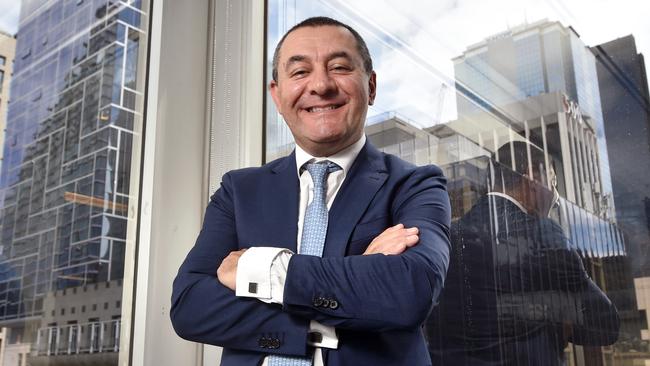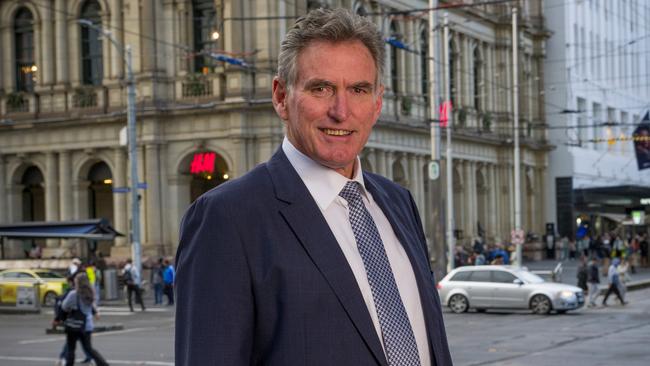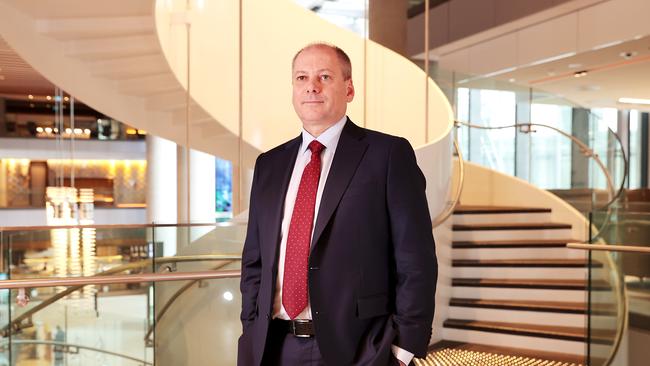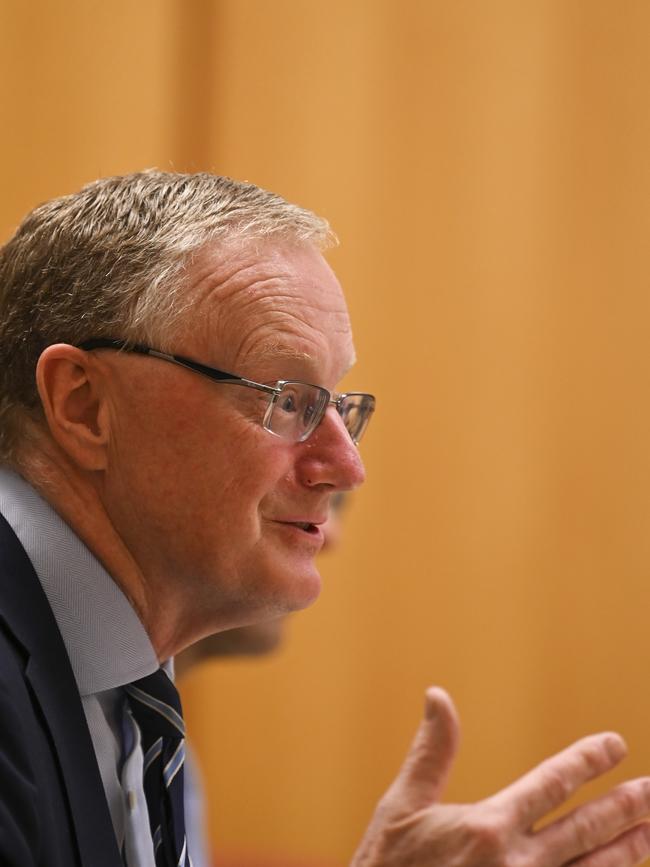Work from home bosses are ‘losing their edge’ and risking a cultural breakdown says Hostplus CEO
Hostplus CEO David Elia says companies will struggle to build a competitive advantage unless they have staff physically in the office. SEE POLL.
Business
Don't miss out on the headlines from Business. Followed categories will be added to My News.
Hostplus chief executive David Elia says companies cannot build a competitive advantage if they prioritise “work from home demands over workplace culture”, as he orders his senior executives to return to the office four days a week.
Mr Elia — whose hospitality superannuation fund oversees more than $100bn in assets, with plans to double that figure in the next five years — says the office environment is “crucial” for maintaining a company culture and driving long-term success.
He said there was also a risk that hybrid or remote working arrangements will lead to companies “prioritising the efficiency dividend which will see their jobs simply outsourced”.
“I’m reluctant to prioritise work from home demands over workplace culture. I believe that longer term, organisations will seek to extract a competitive advantage by placing workplace culture at the forefront of the success of their organisations,” Mr Elia said.
“You can’t achieve this unless you have staff physically present in a commingled office environment.”

His comments come after CBA chief executive Matt Comyn sparked an internal revolt last month when he ordered his staff to work from the office at least 50 per cent of the time.
Comyn’s mandate followed NAB boss Ross McEwan ordering his senior leaders to return to the office five days a week, while Mineral Resources chief executive Chris Ellison has shut down working from home completely.

It has sparked a split among corporate Australia between those who embrace hybrid working arrangements and those who don’t at a time when Reserve Bank governor Philip Lowe has called on workers to lift flatlining productivity to help combat inflation and lower interest rates.
While CBA, NAB, and Mineral Resources have issued work from the office edicts, Westpac has broken ranks from its big four peers, with chief executive Peter King declaring that he trusts his workers to get “your work done in a way that works for you and your team”.
“We are committed to retaining flexibility for our people including through hybrid working and we feel we have the balance right,” Mr King said, joining companies including Telstra, Medibank who also have adopted hybrid working arrangements.
Mr Elia told The Australian that he understood the advantages associated with remote working but it was important to strike the right balance, that not only benefits employees but an organisation “as a whole”.
“While I acknowledge the potential benefits of remote work, such as increased flexibility and improved work-life balance, I also passionately believe in the value of in-person collaboration, connection, and innovation that is fostered within a physical workplace,” he said.
“I firmly believe that a physical workspace plays a vital role in nurturing collaboration, innovation, and the exchange of ideas. Being together in the office allows for spontaneous interactions, the ability to identify when a colleague needs help, and informal mentorship opportunities that are much harder to replicate in a purely remote setting.”
Despite the economy blossoming to near full employment since the end of lockdowns, the nation’s productivity performance last year contracted at the second fastest pace on record.
The RBA board — which will meet on Tuesday to decide on lifting the cash rate further — is becoming increasingly worried that stagnating productivity could force employers to pass on a higher proportion of their climbing labour costs to customers through higher prices.
“Members observed that the forecast for inflation to return to the top of the target band by mid-2025 was predicated on productivity growth returning to around the modest pace recorded prior to the pandemic,” minutes from the RBA’s May meeting — where it unleashed a surprise rate hike — said.
Treasury Secretary Steven Kennedy said poor productivity performance would erase more than half the expected economic bounty from full employment, record migration and the commodity price boom.

While hybrid working has become a new normal across many businesses it has required a nuanced approach, particularly among staff that have made big life decisions during the past three years, such as buying homes in regional areas while keeping their city jobs to enjoy a more balanced lifestyle.
Businesses have had to tread carefully in how they deploy their workforce — while the employment market has remained tight — with more employees willing to sacrifice their jobs as part of a phenomenon known as the “great resignation” if they feel their work/life balance has become skewed.
But Mr Elia said hybrid working threatened to not only derail people’s careers but see their roles outsourced.
“There is therefore a real risk that if employees seek to overly prioritise the productivity benefits of working from home over workplace culture, then in time organisations will respond by prioritising the efficiency dividend which will see their jobs simply outsourced,” he said.

“Organisations will also respond by separating out those employees that are interested in a ‘visible’ career and those that simply want an ‘invisible’ job. If you are invisible to an organisation then you are less likely to receive the same level of investment in professional development and training as someone who is visible.
“To demonstrate this ethos, in early 2022, we returned all staff to the office, three days per week, all coming together in the office on the same days of Tuesday, Wednesday and Thursday in line with one of our value: Better Together.”
Mr Elia said the office environment also provides a dedicated space for employees to immerse themselves in the company‘s vision and values, “fostering a sense of belonging and aligning themselves with our collective purpose”.
“To this end effective from August 1, 2023, the group executive and senior leadership teams of Hostplus will be returning to the office on a four-days-a-week basis.”
Mr Elia also said hybrid working roles may also influence Hostplus’s investment making decisions.
“From an investment perspective, we evaluate companies based on their ability to adapt and thrive in the evolving work landscape,” he said.
“While the extent of remote work within a company may play a role in our considerations, we primarily focus on the overall resilience, innovation, and strategic direction of the organisation. We understand that different industries and roles have varying requirements and capacities for remote work, and we evaluate each case on its individual merits.
“I believe that a hybrid working model, which includes a substantial in-office presence, offers the best of both worlds. It provides employees with the flexibility they may need while maintaining the collaborative and innovative spirit that is crucial for our continued success.
“We are committed to adapting our approach to meet the evolving needs of our members as a whole.”
Originally published as Work from home bosses are ‘losing their edge’ and risking a cultural breakdown says Hostplus CEO





